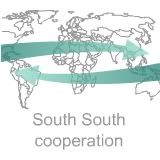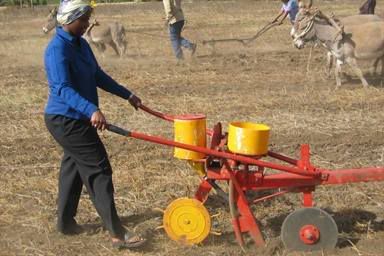FAO project promotes Brazilian technology for agriculture in Africa
 A new FAO project in Kenya and the United Republic of Tanzania is forging links between farming communities and Brazilian firms specialized in production of equipment used in conservation agriculture (CA). The objective of that South-South cooperation is to boost agricultural production in both countries by encouraging a shift to CA techniques, which optimize the use of farm labour and could also help reduce widespread land degradation.
A new FAO project in Kenya and the United Republic of Tanzania is forging links between farming communities and Brazilian firms specialized in production of equipment used in conservation agriculture (CA). The objective of that South-South cooperation is to boost agricultural production in both countries by encouraging a shift to CA techniques, which optimize the use of farm labour and could also help reduce widespread land degradation.Under the three-year, Germany-funded project, up to 4,000 farmers are to be trained through participatory field schools in conservation agriculture practices, including reduced or no-tillage (NT) and the use of permanent soil cover.
Conservation agriculture encompasses a set of complementary agricultural practices based on three principles:
- minimal soil disturbance through reduced or no-tillage in order to preserve soil organic matter
- permanent soil cover (cover crops, residues and mulches) to protect the soil and suppress weeds without need for chemical herbicides
- diversified crop rotations and associations, which promote soil micro-organisms and disrupt plant pests and diseasesmain principles of no-tillage and conservation
 Since dedicated CA implements - such as knife-rollers and direct seeders - are not widely available, the project will take Kenyans and Tanzanians to Brazil to study CA technologies and will design strategies for developing a sustainable equipment supply chain in the subregion. Lessons learned will be "up-scaled" and disseminated throughout Africa.
Since dedicated CA implements - such as knife-rollers and direct seeders - are not widely available, the project will take Kenyans and Tanzanians to Brazil to study CA technologies and will design strategies for developing a sustainable equipment supply chain in the subregion. Lessons learned will be "up-scaled" and disseminated throughout Africa.FAO says conservation agriculture offers Kenyan and Tanzanian farmers a pathway to sustainable agriculture and rural development, which hinges on sustainable land management and better use of available farm labour.
In Tanzania, where the economy is based mainly on small-scale farming and livestock, an estimated 44 percent of the rural population lives below the poverty line. In neighbouring Kenya, the incidence of rural poverty is around 50 percent, despite strong recent growth in the farm sector:
 bioenergy :: biofuels :: energy :: sustainability :: land degradation :: conservation agriculture :: tillage :: South-South :: Kenya :: Tanzania :: Brazil ::
bioenergy :: biofuels :: energy :: sustainability :: land degradation :: conservation agriculture :: tillage :: South-South :: Kenya :: Tanzania :: Brazil ::In both countries, land degradation is a major constraint on the productivity of labour and other external inputs. In addition, farming communities have been seriously weakened by migration to urban areas, the rapid spread of the HIV/AIDS, and the persistence of debilitating diseases such as malaria. The reduction in farm labour availability is forcing farmers to abandon traditional methods of land preparation and other farm operations, and many now plant seed directly into unprepared land immediately after the onset of wet season rains.
"While farmers and extensionists often regard such practices as a poor way of farming, planting without ploughing uses less human labour and animal power," says Josef Kienzle, of FAO's Agricultural and Food Engineering Technologies Service. "So, far from being a 'coping mechanism', no-tillage cultivation has the potential - if carried out in conjunction with other appropriate agronomic practices - to become an important part of strategies to improve food production and stabilize threatened rural livelihoods."
The benefits of no-tillage on small farms are well known in Brazil, which has pioneered conservation agriculture in tropical and subtropical farming systems. The first prototype NT seeder and a prototype knife-roller for residue management were designed in 1985 by Agronomic Institute of Paraná State (IAPAR). Research over the following years bore fruit in 1992, when the Paraná government launched a large-scale evaluation of CA systems and ordered 50 seeders and other equipment from a local manufacturer.
With that political backing, and the support of government and private extension services, other small industries began producing CA equipment and developing new designs tailored to different types of soil, crops and animals. Direct seeding was soon recognized as an excellent means of natural resource conservation, which attracted financial support from the federal government for a programme that encouraged farmers to adopt the innovations.
Economic advantages. Evaluations have confirmed the economic advantages of no-tillage over conventional tillage systems. Trials conducted between 1997 and 1999 showed that the maize yields of no-tillage farmers were 3.5% higher and overall income 11.3% higher. "The most striking differences were observed for returns to labour," says IAPAR's Fátima dos Santos Ribeiro. "Since it requires less labour and distributes labour inputs more evenly across the year, no-tillage systems have a clear advantage."
One study in Brazil's Central-Southern region found that bean production required around 140 hours of labour per hectare using no-tillage methods, compared to 190 h/ha under conventional tillage. In fact, surveys show that, for farmers, the reduction in labour requirements is the most important benefit of no-tillage, ahead of erosion control and even yield increases.
To transfer and adapt that experience to East Africa, the new FAO project will build on the achievements of a pilot CA programme in Kenya and Tanzania, implemented between 2004 and 2006, that created 90 Farmer Field Schools to train farmers and extensionists in CA and sustainable land management. As part of that programme, FAO helped procure a limited quantity of CA equipment from southern Brazil manufacturers.
"In this new phase," says Josef Kienzle, "we will be facilitating the creation of a further 200 field schools, and Brazil has now become a full development partner. An important aim is to help East African equipment manufacturers learn more about Brazilian experience in building a self-sustaining input supply chain for CA equipment, and to promote direct private sector and dealer relationships between Brazil and East Africa."
After an initial study visit by Kenyan and Tanzanian farmers, equipment manufacturers and suppliers to Brazil, Brazilian manufacturers will tour East Africa to gain first-hand knowledge of the small farm sector and the equipment supply chain, with an eye to developing collaborative ventures. The project will explore different approaches to no-till equipment supply in Africa, ranging from direct importation, local assembly and local manufacturing with imported components, to full local production and joint ventures.
Image: In Tanzania, a trainer demonstrates the use of a Brazilian-made direct seeder. Courtesy: FAO.
More information:
FAO's regional partner in the Kenya-Tanzania conservation agriculture project is the African Conservation Tillage (ACT) Network, a Nairobi-based association of farmers, input and machinery manufacturers and suppliers, researchers and extensionists. Founded in 2000 with GTZ support, the network promotes CA as a means of improving food security and rural livelihoods in the region. See the ACT website.
The Conservation Agriculture for Sustainable Agriculture and Rural Development project in Kenya and Tanzania
FAO's Conservation agriculture website
FAO Magazine Spotlight: Conservation agriculture - Feb. 2006
FAO Magazine Spotlight: Zero tillage - Jan. 2001
FAO Magazine Spotlight: "Cover crops" save soil in Brazil - May 2001.
 --------------
--------------


 The Scottish Executive has announced a biomass action plan for Scotland, through which dozens of green energy projects across the region are set to benefit from an additional £3 million of funding. The plan includes greater use of the forestry and agriculture sectors, together with grant support to encourage greater use of biomass products.
The Scottish Executive has announced a biomass action plan for Scotland, through which dozens of green energy projects across the region are set to benefit from an additional £3 million of funding. The plan includes greater use of the forestry and agriculture sectors, together with grant support to encourage greater use of biomass products.








0 Comments:
Post a Comment
Links to this post:
Create a Link
<< Home